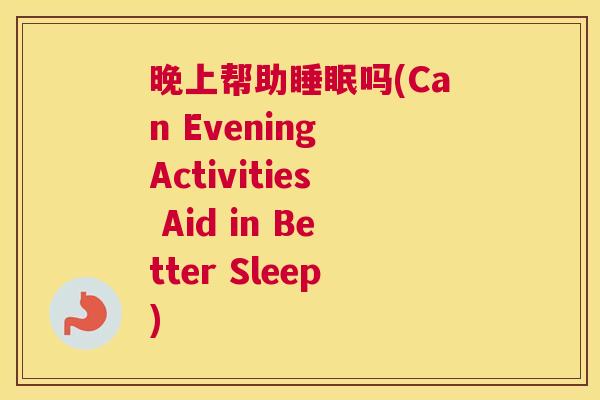晚上帮助睡眠吗(Can Evening Activities Aid in Better Sleep)
Introduction
Sleep plays a crucial role in our overall health and well-being, yet many people struggle to get a good night's rest. While there are various factors that can impact sleep quality, including stress, diet, and lifestyle, evening activities can also influence how well we sleep. In this article, we will explore the potential ways in which evening activities can aid in better sleep and provide practical tips for optimizing bedtime routines.
The Importance of Sleep
Before delving into the specific evening activities that can promote better sleep, it's essential to understand why sleep is so important. Sleep is not merely a period of rest; it is a vital process that allows the body to repair, restore, and rejuvenate itself. During sleep, the brain consolidates memories, the immune system strengthens, and various bodily functions are regulated. Chronic sleep deprivation has been linked to a wide range of health issues, including obesity, diabetes, cardiovascular disease, and impaired cognitive function.
Evening Activities That Promote Better Sleep
1. Relaxation Techniques: Engaging in relaxation techniques, such as deep breathing exercises, progressive muscle relaxation, or meditation, can help calm the mind and prepare the body for sleep. These practices can reduce stress and anxiety, making it easier to fall asleep and stay asleep throughout the night.
2. Light Stretching or Yoga: Gentle stretching or yoga poses can help release tension from the body, promoting relaxation and improving sleep quality. Incorporating a short yoga session or stretching routine into your evening routine can signal to your body that it's time to wind down and prepare for rest.
3. Reading: Reading a book, particularly fiction or non-stimulating material, before bed can be an effective way to relax the mind and distract from the stresses of the day. However, it's essential to avoid reading from electronic devices that emit blue light, as this can interfere with the body's natural sleep-wake cycle.
4. Warm Bath or Shower: Taking a warm bath or shower in the evening can help lower the body's core temperature, which is necessary for initiating sleep. Additionally, the sensation of warm water can promote relaxation and ease muscle tension, making it easier to drift off to sleep.
5. Journaling: Writing in a journal before bed can be a therapeutic way to process emotions, reflect on the day, and clear the mind of racing thoughts. By putting pen to paper and expressing thoughts and feelings, individuals may find it easier to let go of stressors and worries, leading to improved sleep quality.
Tips for Optimizing Bedtime Routines
1. Establish a Consistent Sleep Schedule: Going to bed and waking up at the same time every day, even on weekends, helps regulate the body's internal clock and promotes better sleep quality.
2. Create a Relaxing Sleep Environment: Make your bedroom conducive to sleep by keeping it dark, quiet, and cool. Invest in a comfortable mattress and pillows, and consider using white noise machines or earplugs to block out any disruptive noises.
3. Avoid Stimulating Activities Before Bed: Limit exposure to screens, such as smartphones, computers, and televisions, in the hour leading up to bedtime. The blue light emitted by these devices can suppress the production of melatonin, a hormone that regulates sleep.

4. Limit Caffeine and Alcohol Consumption: Avoid consuming caffeinated beverages or alcohol close to bedtime, as they can interfere with sleep quality and disrupt the sleep cycle.
5. Practice Relaxation Techniques: Incorporate relaxation techniques, such as deep breathing exercises or progressive muscle relaxation, into your bedtime routine to help calm the mind and prepare the body for sleep.
Conclusion
Optimizing evening activities and bedtime routines can significantly impact sleep quality and overall well-being. By incorporating relaxation techniques, engaging in calming activities, and creating a conducive sleep environment, individuals can promote better sleep and wake up feeling refreshed and rejuvenated each morning. Remember that developing healthy sleep habits takes time and consistency, so be patient and experiment with different strategies to find what works best for you.






